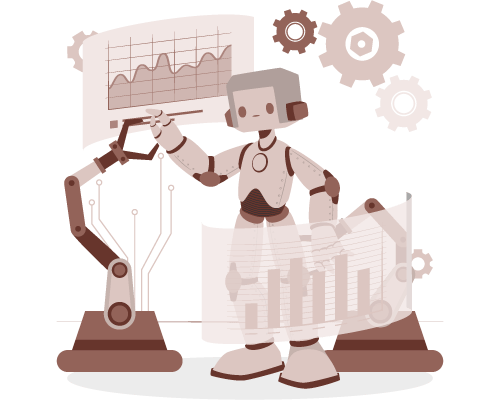
The section of technology that deals with the simulation of human intelligence with the help of machines is called artificial intelligence. Speech recognition, natural model processing, and machine vision are some of the applications that AI can perform. It has the potential to rewrite the entire architectural framework of nearly any process by moving towards easy prospects of automation.
These systems do not have any memory and can only perform specific tasks. IBM’s Deep Blue program was used to beat the then-chess champion, Garry Kasparov, back in the 90s. But it cannot make informed decisions that sprung out of past experiences.
Here better and well-informed decision-making is possible since the decision can be a product of past experiences. Self-driving cars can also be referred to as an example here.
AI systems that are integrated with social intelligence to process and understand human emotions are what we refer to as the theory of mind. They can be helpful in inferring human intentions, identifying patterns, and predicting behaviors which can be essential in understanding the order of our functioning.
Ai equipped with an awareness and sense of own self to give them consciousness is what we refer to as self-awareness. They will be able to understand their own states.
When paired with automation tools, we can simply expand the scope of performance of AI technologies. Robotic Process Automation (RPA) makes the AI perform a function on a recurring basis that can help save a lot of resources and time that is otherwise required to do it with human assistance.
AI systems that are programmed to act without programming are what we refer to as ML. Deep Learning is a subset of ML that involves predictive analytics automation. Supervised learning, unsupervised learning, and reinforced learning are some of the types of ML algorithms.
A machine built with the capacity to see is called machine vision. They can capture and analyze any visual information using three hardware components including a camera, a digital signal processor, and an analog-to-digital conversion.
The design and manufacturing of robots are what this section deals with. Robots with AI technologies can easily perform repetitive tasks that humans cannot perform as consistently.
Text translation, speech recognition, and sentiment analysis with the help of hearing systems programmed to be smart and intelligent are called NLP.
These are a possibility by carefully incorporating image recognition, deep learning, and computer vision.

Artificial intelligence can be highly deployed for increasing overall productivity and efficiency in terms of detail-oriented jobs. There can also be an expectation of consistent results and highly accelerated process operation. They can be powered to present themselves as virtual agents who can take the entire stream of operations a level above. They’re specifically employed to develop business-specific solutions.
At YCSPL, we can help you with solutions that are curated to specifically suit your requirements.
Developing and implementing AI systems can be capital-intensive and require vast technical exposure and expertise. AI can also make a decision only based on what it has been shown and it might not always be the best way forward in a situation. They can never improvise by themselves or generalize tasks between each other.
Weak AI is a system that is built and deployed to complete specific tasks. Virtual personal assistants like Siri are built with software development techniques in combination with weak AI structures.
Strong AI generally carries the capacity to replicate the cognitive abilities of the human brain. They are powered to employ fuzzy logic to arrive at solutions irrespective of the domain of operation.
In other words, the AI program is able to pass the Turing Test and Chinese room test.
Since AI systems can highly respond to coherent data collection and an understanding of past experiences. This can thus be deployed for easy prediction and processing of crucial information like the stock market standings. Informed decision-making capabilities here can help us understand and engage in the trading climate better.
With behavior data, AI algorithms can help us with better decision-making and present us with an effective cross-selling strategy. All these recommendations can help engage the crowd better and improve your conversion rates in the longer run.
Since they work on understanding past interactions, they can act as your virtual agents in your absence and help spread your USPs even when you’re not directly around.
The question of what is artificial intelligence is not something simply answerable because of the conditions and progress around it. Talk to us to engage in any software development project that you need assistance with.
Change becomes the most dynamic, powerful source of progress you have

